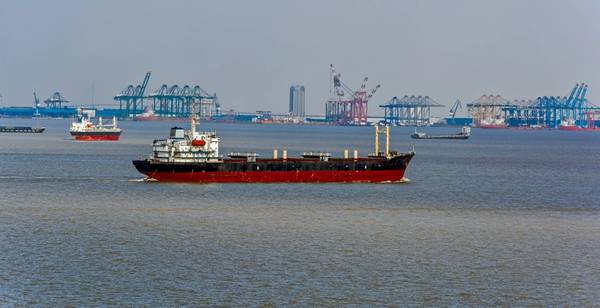
It's tempting to look at China's imports of major commodities in July and conclude that the strength is a sign that the escalating trade dispute with the United States isn't having much of an impact.
While the first of the tit-for-tat tariffs came into effect in July, it will likely take several months before any real impact is discernible, and even then, separating out the effect of trade measures from other factors will be tricky.
In the meantime, the commodity trade data can still provide insight to China's economy, and it's largely painting a picture of resilience.
Imports of crude oil rose slightly in July to about 8.48 million barrels per day (bpd), up from June's 8.36 million, according to customs data released on Wednesday.
However, the market chose to focus more on the fact that July was the third-weakest month this year, and that the smaller, independent refiners known as teapots have cut back on their purchases.
A combination of higher crude prices and changes in government taxes have been blamed for the weak growth in crude imports, and these factors have certainly tilted the playing field against smaller refiners.
It's also worth noting that China's exports of refined products slipped in July, to 4.57 million tonnes, which equates to about 1.18 million bpd, using a conversion factor of 8 barrels of product per tonne of crude.
This was down from about 1.27 million bpd in June, showing that some of the softness in crude imports can be ascribed to a slowing in the exports of refined fuels.
Where there was unambiguous strength in China's commodity imports was in iron ore and coal.
Iron ore imports rebounded to 89.96 million tonnes in July from 83.24 million in June, although they are still down 0.7 percent for the first seven months of the year compared to the same period in 2017.
The robust imports of iron ore can largely be ascribed to near record margins for steel producers and record output as mills try to maximize profits.
An ongoing switch to higher grade iron ore by mills seeking to boost output while minimizing emissions has also favored imported iron ore over domestic output, which tends be low quality.
Lower prices for iron ore during May and June, when July delivery cargoes would have been arranged, may also have contributed to the surge in imports.
Heatwave Boosts Coal
Coal imports leapt to the highest in 4-1/2 years, increasing 14 percent from June to 29.01 million tonnes in July.
The surge can largely be put down to the heatwave afflicting much of the northern hemisphere, with China boosting power generation from thermal plants to cope with the additional demand for air-conditioning.
Curbs on domestic output have also encouraged imports, with the latest available data showing production fell 1.4 percent in June to an eight-month low.
The preliminary customs data released on Wednesday also doesn't break down the types of coal being imported, and official details on this have not been released since March.
However, it's likely that in addition to strong demand for thermal coal for power generation, imports of coking coal for steel-making have been rising as well.
This is because domestic coking coal output has been dropping, with a 4.7 percent slide reported in June and production for the first six months slipping 3.2 percent from the same period in 2017.
The major industrial commodity most exposed to any pullback from the trade dispute with the administration of President Donald Trump is copper, but so far this hasn't happened.
Imports of unwrought copper rose 2.7 percent in July to 452,000 tonnes, while inbound shipments of copper ores and concentrates were up 5.4 percent to 1.845 million tonnes.
Given copper's importance in manufacturing and construction, any sign of weakness in Chinese demand would raise concerns about the impact of the trade dispute.
Overall, China's commodity imports aren't raising any red flags, even if the strength in coal and iron ore looks to be partly the result of temporary factors.
But it's early days yet in the trade dispute, and it's likely that imports in the fourth quarter of this year may be more instructive as to any impact.
(Editing by Richard Pullin)




